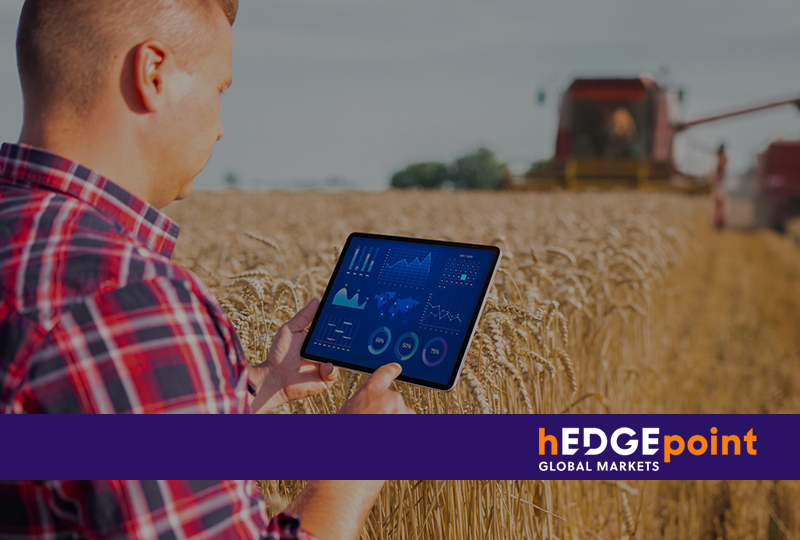
It isn’t anything new to see commodity markets modernizing. Increasingly, agribusiness and the commodity chain are exploring technologies that can optimize

It isn’t anything new to see commodity markets modernizing. Increasingly, agribusiness and the commodity chain are exploring technologies that can optimize their processes and reduce costs in the meantime. Thus, artificial intelligence (AI) shouldn’t be left out.
It’s been a while since automation arrived in the field, with machines that can do the work of many people, much faster and more accurately. Now it’s data analysis that wins out.
According to Kim Benni, Global Head of Trading & Quantitative at hEDGEpoint: although the term Artificial Intelligence has gained a higher profile recently, due to the emergence of new tools that are becoming more successful, this type of technology is already widely used, including at hEDGEpoint and in commodity markets.

“When we use methods of data analysis to assess market risks, satellite images, prices, and sentiment on a subject much talked about on Twitter, all of this is already artificial intelligence,” explains Benni.
But how can this technology impact commodity markets, either positively or negatively?
There are many ways in which AI is expected to impact the wider economy. In the area of commodities, it won’t be any different. Due to the specific characteristics of this market, some of its uses may relate to the weather, for example.
“There are some AI methods capable of connecting meteorological data with precipitation and productivity data,” says Benni. “One of them is to analyze large data amounts and find relationships, such as the temperature of the ocean off the coast of Brazil and the amount of rain that will fall in soy-producing areas in the same place.”
Twitter, for example, is a source of high-volume information. The tools used therein can select relevant tweets and analyzing “sentiment”, for instance, which is called the categorization of a message as either positive or negative.
With this, it’s possible to have an idea of what will happen to price tendencies. “Basically, we’re going to search Twitter for corn, through a bunch of keywords that really reflects sentiment about what’s going on with corn. Or it could be about wheat, barley, crude oil, or any other commodity. This is a view that we use in our models to do market analysis,” Benni continues.
He explains that to make this assessment, commands are created for AI to recognize (for example, emojis that express feelings, when the text is all in caps lock, which usually means anger), like words that characterize criticism or satisfaction. Thus, it’s possible to classify a huge amount of data very quickly.
But data analytics is just one type of artificial intelligence that can impact commodity markets. One of the most revolutionary tools that’s been widely used and debated recently is ChatGPT, a virtual assistant in the form of a bot that’s capable of creating texts, from the simplest to the most complex, based on a simple briefing.
It also works as a search engine and causes concern for others already consolidated, such as Google, for delivering answers more “promptly.” Before we users had to search and read several different sources to get all the answers we wanted. Now he can simply ask ChatGPT and have a text created exclusively and quickly, which can then be replicated in other ways.
Another way of using artificial intelligence that can directly impact commodity markets is using autonomous vehicles. In the future, we’ll be able to carry freight and send loads by trucks that use autopilot.
Currently there are already motor vehicles that work in the field, guided by GPS and sensors. There’s also the expectation of using cars and trucks that eliminate the need for human drivers. With this, commodity markets would gain in terms of time saved, as they wouldn’t need to stop, and thus would reduce costs.
The Global Head of Trading & Quantitative, Kim Benni, warns that this will be a great evolution, but it’s necessary to think a lot about potential impacts on society.
Benni’s final message is that it’s vital to prepare for the future and keep up to date on artificial intelligence and everything else that appears from now on related to it. “It’s like not knowing how to use a computer. In the 1980s, it wasn’t a problem. Today, it’s not a problem not to understand AI, but 40 years from now, or maybe even 20 years from now, if you’re not fluent in AI, you’re going to have a problem. So, you need to prepare for that.”
hEDGEpoint already uses the latest technology to manage risks throughout the agricultural commodity and energy market chains. We provide hedging products based on innovation, technology, and market insights, placing the customer at the center of the entire process, and in this way, contribute more to your business success.
All in all, hEDGEpoint works with over 50 different commodities, numerous currencies (FX), and over 400 hedging products. All this has been developed with a focus on technology and a desire to promote the best experience in all processes.
With Brazilian DNA, hEDGEpoint is present on five continents. This is why it’s able to connect the local needs of each sector to the global context, while democratizing access to knowledge of risk management.
Talk to a hEDGEpoint specialist today and learn how to better protect your business from market risks.

Rua Funchal, 418, 18º andar - Vila Olímpia São Paulo, SP, Brasil
Contato
(00) 99999-8888 example@mail.com
Section
Home
O que Fazemos
Mercado
Quem Somos
HUB
Blog
Esta página foi preparada pela Hedgepoint Schweiz AG e suas afiliadas (“Hedgepoint”) exclusivamente para fins informativos e instrutivos, sem o objetivo de estabelecer obrigações ou compromissos com terceiros, nem de promover uma oferta ou solicitação de oferta de venda ou compra de quaisquer valores mobiliários, commodity interests ou produtos de investimento.
A Hedgepoint e suas associadas renunciam expressamente a qualquer uso das informações contidas neste documento que direta ou indiretamente resulte em danos ou prejuízos de qualquer natureza. As informações são obtidas de fontes que acreditamos serem confiáveis, mas não garantimos a atualidade ou precisão dessas informações.
O trading de commodity interests, como futuros, opções e swaps, envolve um risco substancial de perda e pode não ser adequado para todos os investidores. Você deve considerar cuidadosamente se esse tipo de negociação é adequado para você, levando em conta sua situação financeira. O desempenho passado não é necessariamente indicativo de resultados futuros. Os clientes devem confiar em seu próprio julgamento independente e/ou consultores antes de realizar qualquer transação.
A Hedgepoint não fornece consultoria jurídica, tributária ou contábil, sendo de sua responsabilidade buscar essas orientações separadamente.
A Hedgepoint Schweiz AG está organizada, constituída e existente sob as leis da Suíça, é afiliada à ARIF, a Associação Romande des Intermédiaires Financiers, que é uma Organização de Autorregulação autorizada pela FINMA. A Hedgepoint Commodities LLC está organizada, constituída e existente sob as leis dos Estados Unidos, sendo autorizada e regulada pela Commodity Futures Trading Commission (CFTC) e é membro da National Futures Association (NFA), atuando como Introducing Broker e Commodity Trading Advisor. A Hedgepoint Global Markets Limited é regulada pela Dubai Financial Services Authority. O conteúdo é direcionado a Clientes Profissionais e não a Clientes de Varejo. A Hedgepoint Global Markets PTE. Ltd está organizada, constituída e existente sob as leis de Singapura, isenta de obter uma licença de serviços financeiros conforme o Segundo Anexo do Securities and Futures (Licensing and Conduct of Business) Act, pela Monetary Authority of Singapore (MAS). A Hedgepoint Global Markets DTVM Ltda. é autorizada e regulada no Brasil pelo Banco Central do Brasil (BCB) e pela Comissão de Valores Mobiliários (CVM). A Hedgepoint Serviços Ltda. está organizada, constituída e existente sob as leis do Brasil. A Hedgepoint Global Markets S.A. está organizada, constituída e existente sob as leis do Uruguai.
Em caso de dúvidas não resolvidas no primeiro contato com o atendimento ao cliente (client.services@hedgepointglobal.com), entre em contato com o canal de ouvidoria interna (ombudsman@hedgepointglobal.com – global ou ouvidoria@hedgepointglobal.com – apenas Brasil) ou ligue para 0800-8788408 (apenas Brasil).
Integridade, ética e transparência são valores que guiam nossa cultura. Para fortalecer ainda mais nossas práticas, a Hedgepoint possui um canal de denúncias para colaboradores e terceiros via e-mail ethicline@hedgepointglobal.com ou pelo formulário Ethic Line – Hedgepoint Global Markets.
Nota de segurança: Todos os contatos com clientes e parceiros são realizados exclusivamente por meio do nosso domínio @hedgepointglobal.com. Não aceite informações, boletos, extratos ou solicitações de outros domínios e preste atenção especial a variações em letras ou grafias, pois podem indicar uma situação fraudulenta.
“Hedgepoint” e o logotipo “Hedgepoint” são marcas de uso exclusivo da Hedgepoint e/ou de suas afiliadas. O uso ou reprodução é proibido, a menos que expressamente autorizado pela HedgePoint.
Além disso, o uso de outras marcas neste documento foi autorizado apenas para fins de identificação. Isso, portanto, não implica quaisquer direitos da HedgePoint sobre essas marcas ou implica endosso, associação ou aprovação pelos proprietários dessas marcas com a Hedgepoint ou suas afiliadas.
aA Hedgepoint Global Markets é correspondente cambial do Ebury Banco de Câmbio, de acordo com a resolução CMN Nº 4.935, DE 29 DE JULHO DE 2021, Artigo 14 do Banco Central do Brasil (BACEN).
Para mais informações sobre nosso parceiro, serviços disponíveis, atendimento e ouvidoria, acesse o link a seguir: https://br.ebury.com/